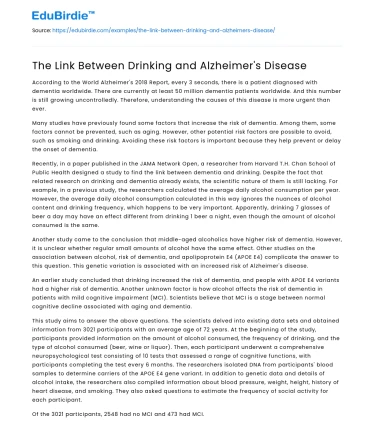According to the World Alzheimer's 2018 Report, every 3 seconds, there is a patient diagnosed with dementia worldwide. There are currently at least 50 million dementia patients worldwide. And this number is still growing uncontrolledly. Therefore, understanding the causes of this disease is more urgent than ever.
Many studies have previously found some factors that increase the risk of dementia. Among them, some factors cannot be prevented, such as aging. However, other potential risk factors are possible to avoid, such as smoking and drinking. Avoiding these risk factors is important because they help prevent or delay the onset of dementia.
Save your time!
We can take care of your essay
- Proper editing and formatting
- Free revision, title page, and bibliography
- Flexible prices and money-back guarantee
Recently, in a paper published in the JAMA Network Open, a researcher from Harvard T.H. Chan School of Public Health designed a study to find the link between dementia and drinking. Despite the fact that related research on drinking and dementia already exists, the scientific nature of them is still lacking. For example, in a previous study, the researchers calculated the average daily alcohol consumption per year. However, the average daily alcohol consumption calculated in this way ignores the nuances of alcohol content and drinking frequency, which happens to be very important. Apparently, drinking 7 glasses of beer a day may have an effect different from drinking 1 beer a night, even though the amount of alcohol consumed is the same.
Another study came to the conclusion that middle-aged alcoholics have higher risk of dementia. However, it is unclear whether regular small amounts of alcohol have the same effect. Other studies on the association between alcohol, risk of dementia, and apolipoprotein E4 (APOE E4) complicate the answer to this question. This genetic variation is associated with an increased risk of Alzheimer's disease.
An earlier study concluded that drinking increased the risk of dementia, and people with APOE E4 variants had a higher risk of dementia. Another unknown factor is how alcohol affects the risk of dementia in patients with mild cognitive impairment (MCI). Scientists believe that MCI is a stage between normal cognitive decline associated with aging and dementia.
This study aims to answer the above questions. The scientists delved into existing data sets and obtained information from 3021 participants with an average age of 72 years. At the beginning of the study, participants provided information on the amount of alcohol consumed, the frequency of drinking, and the type of alcohol consumed (beer, wine or liquor). Then, each participant underwent a comprehensive neuropsychological test consisting of 10 tests that assessed a range of cognitive functions, with participants completing the test every 6 months. The researchers isolated DNA from participants' blood samples to determine carriers of the APOE E4 gene variant. In addition to genetic data and details of alcohol intake, the researchers also compiled information about blood pressure, weight, height, history of heart disease, and smoking. They also asked questions to estimate the frequency of social activity for each participant.
Of the 3021 participants, 2548 had no MCI and 473 had MCI. During approximately 6 years of follow-up, 512 participants were diagnosed with dementia. It was also found that among those without MCI, the risk of dementia was higher in people who did not drink than those who drank less than one drink a week.
When they analyzed the population with MCI, similar results were obtained and no statistically significant differences were found. However, compared with people who drank less than one drink a week, MCI patients who drank more than 14 drinks per week had a 72% higher risk of dementia. The authors also noted some of the differences associated with drinking patterns: “In the absence of a baseline for MCI, people who drink a small amount of alcohol per day have a lower risk of dementia than those who do not drink often but drink a lot each time.” Although researchers are always enthusiastic about emphasizing the negative effects of excessive drinking on brain health and overall health, they also pointed out: 'Our findings reaffirm that drinking within the recommended limits does not increase the risk of dementia in older people with normal cognitive ability.” When the researchers analyzed the potential impact of APOE E4, no significant effects were found, as confirmed in several previous studies. The authors speculate that the results suggest that APOE E4 has no significant effect, probably because this association is more pronounced in the young population. Further research is necessary.
In short, current research cannot provide a reliable answer. However, it confirms that the relationship between alcohol and dementia is very complex and more research is needed in the future. As one of the world leading suppliers of chemical reagents and kinase inhibitors, BOC Sciences has directed sincere efforts toward providing customers with high quality small molecule reagents for Alzheimer's disease research, including the following categories: CaMK-II, Microtubule/Tubulin, γ-secretase, GSK-3, Estrogen Receptor/ERR, DYRK ,Sirtuin, COX, AMPAR, Sodium Channel, Tau, β-secretase, NMDA Receptor, PERK, AChE, Hedgehog, Dopamine β-hydroxylase, Amyloid-β, nAChR, Monoamine Oxidase, and FLAP.






 Stuck on your essay?
Stuck on your essay?

